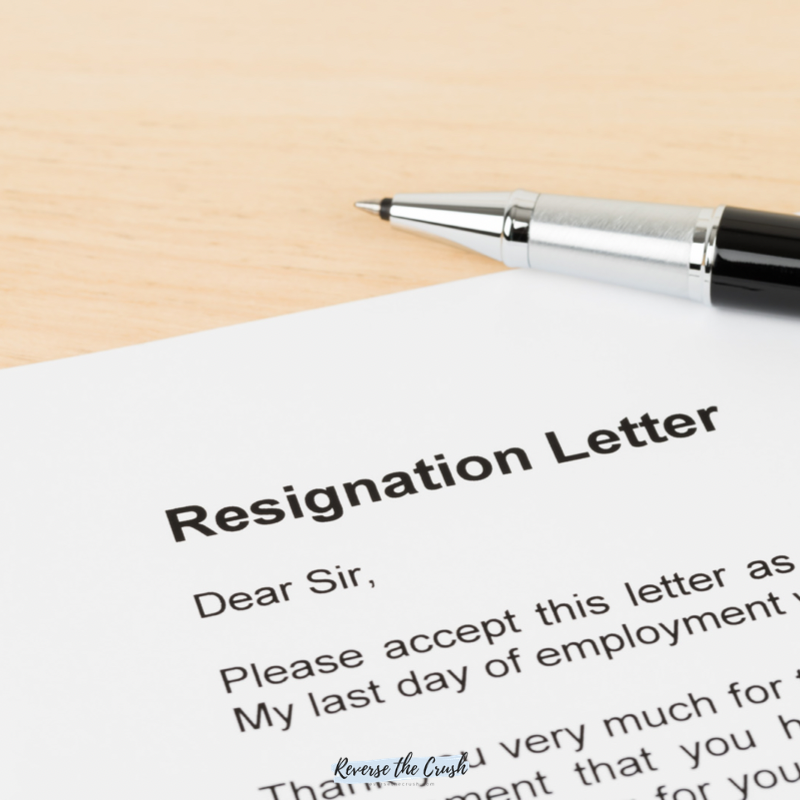How to quit a job you just started: 10 tips to quit your job the right way. Uphold your reputation and handle your resignation intelligently.
Quitting a job that you just started is a stressful thing to do.
If you are a decent person, you don’t want to waste someone’s time or seem ungrateful for the opportunity.
Fortunately, there is a right way to quit a job you just started. It’s mostly about being honest and respectful. But there are a few key details to ensure you leave on the right note.
In this post, I will show you how to quit a job you just started so that you don’t hurt your professional reputation.
Let’s jump right in.

How To Quit A Job You Just Started: My Own Experience
I had a hard time obtaining a job when I first got out of college.
I didn’t have any networking connections through my parents or someone I knew—I had to do it on my own.
What’s more is that I was trying to find a job shortly after a global recession.
Since my student loan payments were coming up and I was literally broke, I had to find a way to make money fast.
As such, I took a landscaping job at a local cemetery. It was hard work. I cut grass, raked, and weeded gardens.
Of course, deep down I knew I wasn’t going to be there for very long. I was constantly looking for and applying to jobs that were more related to my business marketing field.
In total, I lasted three weeks at that landscaping job before I obtained a job working for a telecommunications company.
I could have easily burned the bridge and just stopped showing up. I mean, it wasn’t related to my career field anyways. But I was grateful for the opportunity and I wanted to be respectful.
So, I went to my boss and respectfully told the exact truth. To my surprise, he was very understanding. He even allowed me to stop working before my two weeks’ notice was up.
In other jobs I’ve had, even jobs I worked longer at, I’ve always made an effort to leave on the right terms. You just never know who you’re going to meet down the road.
Hence why it’s always best to leave a job on the right terms. This way, you can avoid feeling guilty, and it’s the best choice for selfish reasons too. It lets you maintain a good reputation and build relationships that could affect your career down the road.
How To Quit A Job You Just Started

1. Be Honest And Tell The Truth
The most important step of quitting the right way is being honest. Don’t lie.
Frankly, telling the truth is the best move in any situation.
The most honest answer is always the right answer.
By telling your employer the exact reason you are quitting in such a hurry, they will be more likely to understand.
Of course, if you absolutely hate your job, you don’t want to tell them the negative reasons why you are quitting. Focus on the positive reasons.
You just need to tell them that you are making the best move for your career path. Any good employer will respect that.
2. Write A Professional Resignation Letter And A Thank You Note To Your Employer
Nowadays, we like to communicate by text message, WhatsApp, and on social media.
But these methods of communications aren’t going to cut it when you are resigning.
To resign the right way, you need to write a professional resignation letter and a thank you note to your former employer.
In the letter, tell them what you learned while you were there and what you will takeaway from the company. Everyone knows corporations love “takeaways.”
In addition, be sure to thank them for the opportunity.
If you don’t know how to write a resignation letter, do a quick search on Google to get an idea.
3. Submit Your Resignation In Person (If Allowed)
Of course, you don’t want to just email or mail your resignation letter. That’s not good enough.
If it is allowed, you should give your resignation letter in person.
It’s the respectful thing to do, and it shows that you care enough to take the time to meet in person.

4. Write A Thank You E-mail To Staff
Another good tip for leaving on the right terms is to send a thank you email to the staff you worked with.
You don’t want to just leave on good terms with your boss or employer, you also want to thank your former colleagues.
For selfish reasons, it’s just good business.
You never know what kind of relationships could develop with your former colleagues.
When I quit my last job to switch to part-time work, I sent an e-mail to every person I worked with.
I told them how I enjoyed working with them and encouraged them all to stay in touch.
I’m glad I did, too, because I ended up dating one of them. I also keep in touch with a few of the others.
5. Don’t Burn Bridges
Even if you despise your former employer and boss, you don’t win by burning bridges.
In fact, they win if you do that.
Because they have the power to blacklist you or decline references in the future.
If you really want to win, say the right things and move on to something better. Go work for a competitor if you must.
At the end of the day, work is about making money. You don’t need to take things a business does personally. They exist to make money.
So, get what you want from them. Get references, money, and experience, then move on without burning bridges.
Basically, you never want to give people something that they can use against you in the future.
6. Give Two Weeks’ Notice
If you are an adult, you understand that sometimes you have to do things you don’t want to do.
It’s the same for quitting a job.
As much as you don’t want to ever step foot in the office again, it’s the right thing to do.
It shows the company that you are still a trustworthy person.
It proves that you keep your promises. It makes you honourable.
And because you went out of your way to uphold your end of the deal, they will likely go out of their way for you if you ever need a reference, or if you want to go back.

7. Don’t Mentally Check Out
Although your performance no longer matters, you don’t want to just slack off.
It’s a bad look. It’s lazy and shows no pride in your work.
Furthermore, people will talk about how you lazy you were when you left. I’ve heard it at previous employers I worked at.
I’ve even heard managers talk trash about former employers that left on bad terms. Personally, I feel like it’s a bad look for both people. But maybe they trusted that I wouldn’t share it—I wouldn’t in any direct way. Just here on my anonymous blog.
8. Obtain Another Job Before You Quit
If you’re going to quit your job, make sure you have another job lined up first, or make sure you have a fool-proof plan.
The last thing you want to do is suffer a financial setback.
As an INTJ personality and long-term thinker, I tend to avoid making impulsive decisions. This is especially true now that I’m older and more self-aware.
If I make a decision, I’ve probably thought about for a long time and it likely fits into to my overall grand scheme.
When I switched to part-time work, I estimated how much money I would need in the worst-case scenario to make sure I could afford it.
Although I am desperately seeking financial independence in pursuit of more fulfilling work, I am doing so in the safest way possible by having a part-time job.
Try to avoid making impulsive decisions that negatively affect your long-term career.
9. Consider What You Will Say If They Ask You To Stay
Because I’m an introvert and meaningless words don’t naturally flow out of my mouth, I usually think of my answers in advance.
At work, it’s almost like I’m in a never-ending interview.
If you ask me a question, I’ve probably already thought of the question you asked and prepared an answer for it.
I think it is a wise move to prepare in advance for any backlash or questions that may come your way if you quit. That way, if they question why you are leaving, you already have a response ready.
In short, be prepared for any negative questioning or confrontation so that you can respond the right way.
10. Don’t Complain About Your Job Online (Before Or After You Quit)
In our digital era, we are constantly being monitored.
Even when we’re off the clock, we’re supposed to reflect the brands we work for.
Admittedly, I find filtering myself to be challenging and bothersome. I’ve succumbed to venting my frustrations in the past.
I wish we were all allowed to share our complete opinions.
However, that’s not the world we live in.
So, as much as I’m tempted to vent about the companies I’ve worked for, I try my best not to.
Simply put, don’t vent about your former employer on social media just because you no longer work there. It could harm your reputation and it’s not the right way to leave.
If you have to say something, try to focus on what’s good about your new employer as opposed to focusing on the negatives of your previous job.

How To Quit A Job You Just Started – Final Thoughts
In summary, you don’t have to be scared to quit on a short notice.
It might seem like an intimidating process, but if you handle it the right way, your employer will respect your decision.
They might even be happy for you and be willing to help you.
Just be honest about it and do everything you can to help with your transition.
Be respectful and remember to not burn any bridges.
As much as it would be fun to walk out in a dramatic fashion, you should always be thinking about what will benefit your long-term career the most.
Related Articles On Jobbing
9 High Paying Part-time Jobs To Free Up More Time
Low Education Jobs With High Pay
I am not a licensed investment or tax adviser. All opinions are my own. This post may contain advertisements by Monumetric. This post may also contain internal links, affiliate links to BizBudding, Amazon, Bluehost, and Questrade, links to trusted external sites, and links to RTC social media accounts.
Connect with RTC
Twitter: @Reversethecrush
Pinterest: @reversethecrushblog
Instagram: @reversethecrush_
Facebook: @reversethecrushblog
Email: graham@reversethecrush.com


 Financial Planning Checklist: What Are The Six Steps In The Financial Planning Process?
Financial Planning Checklist: What Are The Six Steps In The Financial Planning Process?
